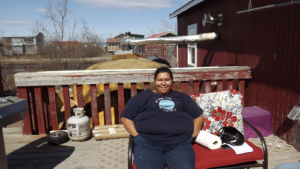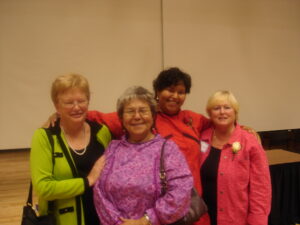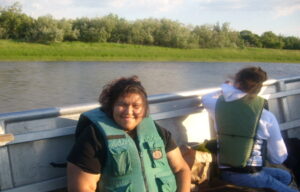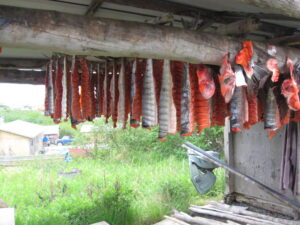PA Teresa Lowe Advocates for Culturally Competent Care for Alaska Natives
‘I want to leave the world in a better place by helping our providers be more empathetic towards our Alaska Native people’
November 3, 2023
By Jennifer Walker

PA Teresa Lowe grew up in Mountain Village, Alaska, a community that currently has a population of 845 people, about 97% of whom are Alaska Native or American Indian. There, the healthcare system was organized in a way that involved ample travel and expenses: significant barriers that affected community members’ access to care.
When Lowe needed care in her village, she first saw a community health aide. These trained healthcare professionals examine patients, chart their findings, and then communicate with physicians at the closest hospital in another village to make a diagnosis.
If Lowe needed care beyond what the community health aide could provide, such as X-rays or CAT scans, she would have to travel one hour by plane to Yukon-Kuskokwim Health Corporation Regional Hospital in Bethel, the hub hospital for 58 rural villages in southwest Alaska. The hospital has an emergency department, anesthesiology services, and family practice clinics, as well as the ability to perform emergency C-sections and in-office procedures like colonoscopies.
From there, if Lowe needed an even higher level of care, such as surgery, she would have to take another one-hour flight, this time to Anchorage. Patients who traveled to Anchorage often needed to pay for accommodations, food, and transportation while they stayed for seven to 10 days after their surgery.

While Lowe said Mountain Village, with its open spaces and close-knit community, was a lovely place to grow up, accessing healthcare continues to be a challenge for Alaska Natives who live there or in one of the state’s approximate 240 other rural villages. “What if you’re someone who doesn’t have the money to fly to see a provider?” Lowe said. “You just deal with things as they are.” Lowe remembers a young patient, about 10 years old, who had an ear infection for three months for exactly this reason.
Today, as the Anchorage campus coordinator for the MEDEX Northwest PA Program, Lowe, who has worked clinically in both hub hospitals and villages, wants her students to understand how this healthcare system structure creates barriers to care for Alaska Natives and other communities. She also educates her students about traditions and beliefs among the Alaska Native population that clinicians might encounter when working with patients.
“I think it’s important that a lot of people who are going to practice in Alaska have an idea of some of the cultural things they’re going to have to figure out,” Lowe said. “Being able to work with students was appealing to me, to teach about these topics and ultimately help our patients live longer, healthier lives and our providers to continue to do what they do for the long-term here in the state.”
Family Roots in Healthcare
 Caring for others runs in Lowe’s family. Her grandmother was a midwife in Mountain Village. Her mother, Martha Flores, a former community health aide who attended the MEDEX Northwest PA program in Seattle, retired after 37 years of service to the people of the Yukon-Kuskokwim Delta (YK Delta) in southwestern Alaska.
Caring for others runs in Lowe’s family. Her grandmother was a midwife in Mountain Village. Her mother, Martha Flores, a former community health aide who attended the MEDEX Northwest PA program in Seattle, retired after 37 years of service to the people of the Yukon-Kuskokwim Delta (YK Delta) in southwestern Alaska.
Like her mom, Lowe attended the MEDEX Northwest PA Program in Seattle. She worked all summer to pay for her flight there and back, and she lived on peanut butter and jelly sandwiches while in school. “I had no idea how I was going to do it financially and academically,” she said. “But I knew that there was no choice because I had seen this plan to become a PA.” It helped that she received a scholarship loan from the Yukon-Kuskokwim Health Corporation (YKHC). This gave her money for school, but in return, she had to work for the YKHC after her graduation.
In 2005, Lowe took a position with a hospital in Bethel as a family medicine PA, which gave her several opportunities to help the people of the YK Delta. She also became a forensics examiner for the sexual assault response team. Sexual violence is prevalent in Alaska, both then and today: In 2020, nearly 58% of women in the state reported having experienced sexual violence, intimate partner violence, or both in their lifetimes—about a 15% increase since 2015, according to the most recent Alaska Victimization Survey. In these positions, Lowe found it difficult to give her patients the care they needed. There was a shortage of providers at times and a system of overbooking, which meant that Lowe often had three to five patients scheduled at a time.
There were also roadblocks to providing care. As a hospital that services Alaska Native and American Indians, there was more paperwork involved to coordinate services for those who needed a higher level of care at hospitals in Anchorage. Lowe also dealt with specialists who questioned why she was providing care to patients instead of “a real doctor.”
“As someone who is invested in my patients’ care, this takes a big emotional toll,” she said. “At one point, I was crying every single day at lunch time because I couldn’t help. I was so burned out just trying to do the right thing for my patients.”

Over the next 14 years, Lowe worked in a variety of settings. She began teaching with the MEDEX Northwest PA Program. She took a break from her PA practice after adopting a baby, but used this time to complete a master’s degree in professional communications with the University of Alaska in Fairbanks. She worked with the Tulalip Tribes in Seattle, and in family practice and urgent care in Barrow, Bethel, and Fairbanks in Alaska.
Then in 2021, Lowe wanted to get back into teaching to help prepare future PAs to practice in Alaska. “We need to train our providers in the area that they will ideally be working in,” she said. “When PA students are training, that’s when they start to make connections. Then they are established when they start their PA career.”
Today, as the Anchorage campus coordinator for the MEDEX Northwest PA program—which operates under the Department of Family Medicine at the University of Washington School of Medicine—Lowe is responsible for lecturing and advising, as well as improving the pipeline for people who are interested in moving into a PA role.
Now living in Anchorage, Lowe said her PA career has afforded her a lifestyle that is in stark contrast to the one in which she grew up. In the village, Lowe’s family lived a subsistence lifestyle: For food, the community fished in the summer and gathered berries and hunted birds in the fall, as well as hunted moose and caribou. Lowe also didn’t have running water and her family gathered wood for the wood stove so they could warm their house.
“Now I have a house that has heating. I don’t have to go out and cut and gather wood to keep my house warm,” she said. “I can go into the bathroom and turn on the hot water, and it comes out hot. I feel so incredibly rich to be able to do that.”
Teaching about Cultural Traditions Leads to More Compassionate Care
When she was younger, Lowe considered going to medical school. But she experienced microaggressions as a young person that shaped how she felt about herself and the opportunities that would be available to her in the future. Lowe remembers a particularly gutting interaction as a pre-teen when one of her teachers said, “Teresa, why are you trying so hard? You’re just Native.”

“That’s an important time in the development of people and their long-term goals,” Lowe said. “But if you’re Native and you’re brown-skinned, that level of racism and condensation is always there, even in people who are supposed to be guiding you as a young person. That’s really hard to overcome.” The fact that Lowe’s mother successfully pursued a PA career and went on to become a provider in the community helped Lowe feel confident that she could do the same.
In her work today, Lowe tries to help her PA students learn about Alaska Natives and their culture. For example, Alaska Natives believe that people’s spirits are on a path to meet each of their individual goals. Once these goals are accomplished, their time on Earth is done, and their spirit moves on to the next part of its journey. Thus, death is seen as a part of life, an important belief for PAs to know about when providing care. PAs should also treat patients when they are ready to change rather than forcing change upon them. Community is important, too: Patients’ decisions about their healthcare are influenced when their loved ones have opinions about their options.
When providers understand and respect cultural beliefs like these, it will be easier for them to build meaningful connections and provide compassionate care. “I want to leave the world in a better place by helping our providers be more empathetic toward our Alaska Native people,” Lowe said. “I do this work because it’s important for people to know that Alaska Natives and American Indians are here. Also, I’m in this position because I worked hard to get here. Just because you’re from a village doesn’t mean you can’t have high aspirations in life. It’s important for other people to see that.”
Jennifer Walker is a freelance writer in Baltimore, MD. Contact Jennifer at [email protected].
You Might Also Like
Improving Access to Healthcare in Alaska’s Rural Villages
PA Katherine “Kaesa” GeeBah Footracer Believes Healthcare Can Make the World a More Equitable Place
Kheira Bettir: A Very Classy PA
Thank you for reading AAPA’s News Central
You have 2 articles left this month. Create a free account to read more stories, or become a member for more access to exclusive benefits! Already have an account? Log in.



